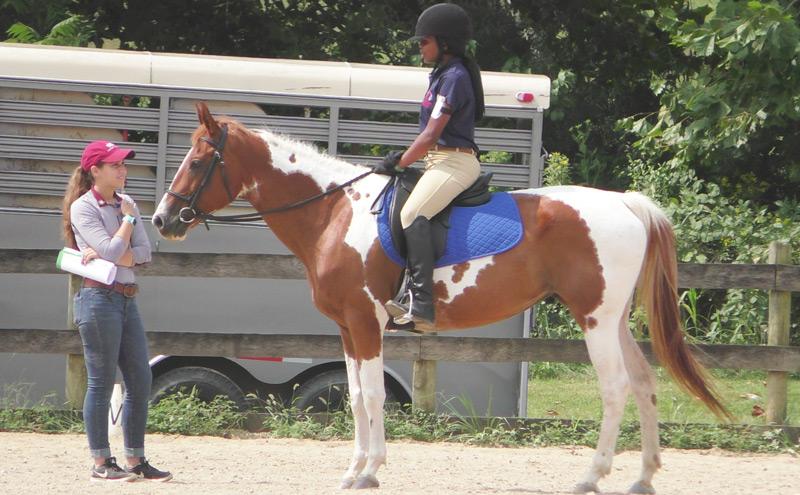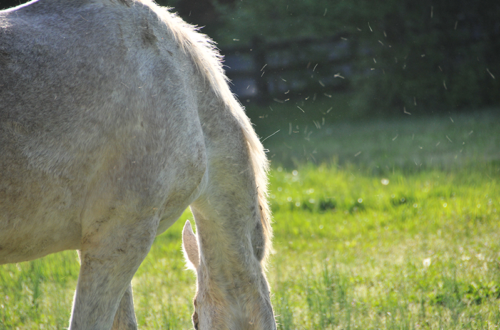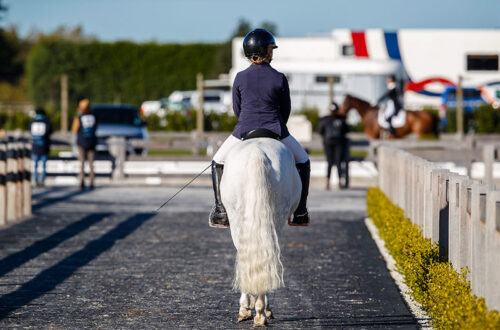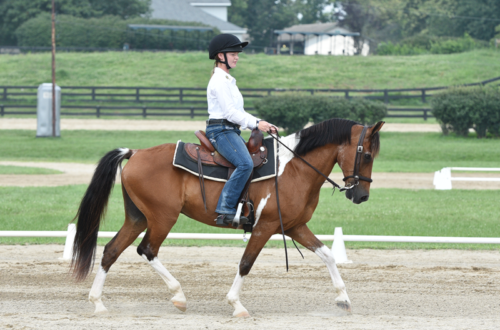
Gearing Up for Certifications: A Personal Point-of-View
By Emily Harris, National Youth Board Chair
Doing a Pony Club certification is very much like competing in a horse show, but it does have its differences. The examiner is like the horse show judge, and your entire test is like the class, but you will be tested on so many things that have specific requirements (e.g., like horse management, bandaging, jogs, out in the open, etc.). The biggest difference is that you are only testing against the Standards of Proficiency no matter how many people are testing with you. Whether you pass or fail, it is left all up to you.
Passing a certification gives me such a gratifying feeling that it often sends me to cloud nine. The challenges, struggles, and the ups and the downs don’t even matter anymore, because all the hard work has paid off, leaving me with a sense of accomplishment. But in reflection, it is the work that you do beforehand and the little details that really set you up for success. Here are the things I do when preparing for certifications.
Plan, plan, PLAN
Whenever I am preparing for a certification, whether it be for Western, English, or Horse Management, I come up with a plan. Having an idea of how I want my certification to go is so helpful. I figure out what my strong points are and what my weak points may be. This will help me find out what things will be easy for me or may require some thought or extra effort. Once I know, I formulate how I can not only nail the strong points, but that I can also try to go for an Exceeds Standard.
This is where knowing how to get an Exceed Standard comes in. If there is a subject or topic that you know very well, feel free to show that off. Get in the habit of explaining things thoroughly and talking out the steps of what you are doing, even for the little things. This is something that you will have to do on the National level, and if you prepare for it at the lower level it will make you stand out and leave a good impression. Then for my weak points, I work on those until they become normal for me.
When taking my C-2 HM, I made sure that I was well prepared. One thing I did was to take the knowledge I had gained outside of Pony Club and connect it with my Pony Club knowledge. For example, my examiner asked me to explain the differences between a buckskin and a palomino horse from a gray horse. Color genetics is something I love and am very passionate about, so I used that. I not only gave the answer from Pony Club’s perspective, but I also went into the scientific aspect of it and broke it down. I had so much fun talking about it and explained it so thoroughly that the examiner was actually surprised by the answer. She ended up telling me that she learned something about the genetics behind the colors from my answer.
Have a Detailed Record Book
Having a really detailed record book speaks volumes about a Pony Club member. Organizing it well will also give you the upper hand. The reason why is because the less work it takes for the examiner to do while going through the record book, the better the impression will be. Put the pages in sheet covers to improve durability, add tabs for quick navigation, add feed samples/labels, and go the extra mile in detailing instructions and stable/stall layouts. The easier you make it for the examiner to picture your barn, stall, or paddock, the better. The goal is to make the examiner feel like they know how you run things based solely from your record book without ever having to ask questions.
Prepare Your Horse
Making sure that you can nail your riding techniques at least 90% of the time, and that your horse is comfortable with different situations, is not only very beneficial, but crucial. Having your horse bail on you is very frustrating. It is also frustrating to have your horse suddenly become nervous, jittery, or scatterbrained caused by an overwhelming environment. Also, being able to explain and talk out what you are doing for the riding portion will help, especially at the local level, as this will prepare you for national certifications. Once you know that your horse is consistent enough for the certification, don’t work your horse too hard the day before. This will ensure that your horse has enough energy for the certification. And don’t forget to have your horse looking sparkly clean and beautifully turned out. I can never stress this point enough! And don’t forget to check for dandruff. That is one aspect that tends to get a lot of people.
Do a Mock Pony Club Certification
Going through a mock certification of your own with a friend, parent, or trainer who acts as examiner can give you an idea of how your certification may flow. It will also give you an idea of your strengths and weaknesses as you go through the motions of your mock test. The idea of the mock certification is to see how well you have prepared. You can also use it to help build up your confidence and lessen some of the stress and negative emotions that can come up before your actual Pony Club certification. If your mock certification is a success, then use that to your advantage. The less stressed you are and the clearer your mind is, the better you will feel about your upcoming test.
Get Enough Rest
This is something you should never take lightly! Make sure that you get enough sleep the night before your certification. If you get enough sleep, you will feel better, more energized, and be ready to face the. The ability to think clearly and communicate effectively is also a huge benefit.
When I took my C-1 Horse Management test, I had only gotten two hours of sleep. There was so much that I had prepared for the night before that I got so worked up to the point that I couldn’t sleep. And let me tell you, that nearly cost me my certification. I was so tired once I got there that when it came to the oral portion of my test, I hit a serious low. I stumbled over my answers, said things backwards, answered the questions with the answer to other questions, and nearly fell asleep during lunch. Thankfully, the examiner was patient with me. She could see that I knew the material, because after every mistake, I immediately corrected it and would answer it well without being prompted. But she attributed it to me being nervous, although I had said that I did not get enough sleep. I am very serious when I say that it is very important to get your sleep.
But really, the most important thing to do when preparing for a certification is to find out how to best prepare for you. You can use your horse show routine to help you prepare. If you need a night to just take your mind off things, do it! If you need to study up until the last minute, that is fine, too. Just figure out what you need and get it done. And although certifications can be a lot of work, they can be very exciting!





